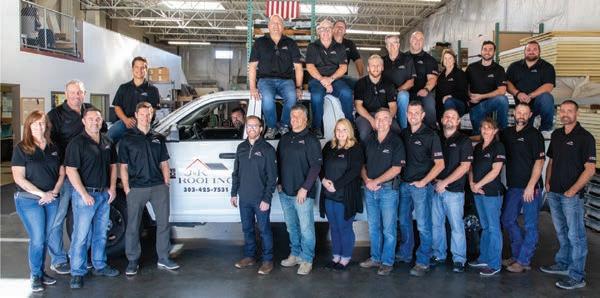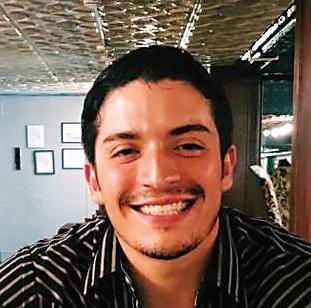
6 minute read
LOCAL
into renewable energy.
Derichsweiler and Ben Burke, chief technology offi cer, co-founded Transitional Energy.
Derichsweiler was the fi rst Native American to graduate from Aurora Central High School and was valedictorian of the Colorado School of Mines’ chemical engineering and petroleum refi ning program and received an MBA fi nance from Pepperdine University. Her grandmother is of Alaskan descent.
In 2018, Derichsweiler, Burke and their executive team, all with experience in the oil refi nery business, talked about helping oil and gas companies reduce carbon emissions to get to net carbon zero.
Transitional Energy also developed the technology and innovative processes to generate renewable electricity at an oil site operated by Grant Canyon Oil and Gas. Its energy powered a section of Grant Canyon’s operations at its oil fi eld and reduced total greenhouse gas emissions.
Transitional Energy also collaborates with ElectraTherm, an Atlanta-based global leader in engineering low-temperature waste heat recovery solutions.
“We are thrilled with the results of this pilot project and happy to see the success of our geothermal equipment,” said Matt Lish, managing director at ElectraTherm. “We look forward to working with Transitional Energy to bring this technology to the oil and gas industry and further our shared goal of reducing carbon emissions and increasing availability of baseload, renewable energy.”
Transitional Energy develops its geothermal energy in lower temperature zones because traditional geothermal development is barred in hotter climates in the Western United States, according to offi cials.
Using a lower capital avenue developed in lower temperature climates creates a hybrid energy source with operational and abandoned oil and gas wells. Its renewable energy opportunities are more cost-effective and plentiful than alternative conventional power generations.
According to offi cials, the United States has 1 million well bores with geothermal facilities. It is Transitional Energy’s goal to provide an affordable and sustainable energy surplus between fossil fuels and renewable energy.
“Just as the world is on a journey to a cleaner energy future, so are we,” Derichweiler said. “Transitional Energy’s initial goal with this pilot was to prove we could produce geothermal energy at an oil and gas site, and we’ve accomplished that. Next up is to optimize our operations for even greater results and scale them to provide an immediate solution that helps bridge the gap between fossil fuels and intermittent renewable energy.”
COFFEE
“They put out a bid for a nonprofi t to operate the coffee shop and Keely Thompson, the previous founder of CUP, had always dreamed of building a coffee house working with young adults,” Borrego said. “It was her idea.”
CUP then shifted its mission to serving young adults, and in 2018, opened a second coffee house — the Reunion Coffee House.
CUP opened its third coffee house, Taza, on Feb. 1.
Taza is Spanish for cup, and the space is designed to feel like a home.
“We named this coffee house Taza because Adams County has the highest population for Latinos,” Borrego said.
Not only does Taza provide jobs for young adults, but it also teaches them life skills by providing a 12-week paid training course. The class focuses on self-awareness, introspection, leadership and character development, Borrego said.
“When you learn life skills or job skills, you build a relationship,” Borrego said. “It was the idea behind the nonprofi t. We used the same mission with families such as women and children.”
When a young adult is not healthy in their household, Borrego said the whole house struggles.
“If we help the young adult, we know we’re helping families,” Borrego said.
Chris Churches is the coffee house director and has been with CUP for four years. She sets up new coffee houses, runs the day-to-day operations and hires the employees.
She started with CUP fi rst as a donor, then worked as a barista and eventually moved up to shift lead and manager and now director. Churches ran her own nonprofi t and a children’s theater company for 20 years.
“Management also takes a two-hour training to have crucial conversations within the workplace, how to identify people skills and build teamwork,” Churches said.
Taza coffee house teaches practical skills such as how to save money to buy a car and rent an apartment but also how to have a crucial conversation and handle relationships with friends, family, parents, roomates and partners.
“We are trying to build lives,” Borrego said.
Aletta Torrez, 21, has been working with Taza since it opened.
“I heard about the program from Chris Churches,” Torrez said. “It’s been a great experience, and I love the classes. I’m learning how to do their social media. It’s amazing.
“It’s the best job I’ve ever worked at, and I used to dread going to work, and I look forward to being at work,” Torrez said.
Jacqulyn Churches has been with CUP for two years.
“I started as just a barista, and now, I do the marketing for all three-coffee houses, videos and signage,” Churches said. “I love working here.”
The Cup also operates the Anythink Coffee shop in the Thornton Anythink Library and is planning to open a fourth location in the Greyhound Park Development in 2023.









Former Prairie View quarterback Ben Meraz.
COURTESY PHOTO

MERAZ
FROM PAGE 1
good relationship with me,” Meraz said. “And then academically, I felt like I could take advantage of a lot of good opportunities that wouldn’t be available elsewhere.”
He will be able to play football, too., as he did at Mesa State University before entering the Army. The Kangaroos won one game in nine tries a season ago. Six to seven schools showed an interest.
Meraz wants to study business finance, then pursue a master’s degree in construction management.
The ongoing pandemic didn’t play a part in his recruiting process. But joining the NCAA’s transfer portal, which allows students to place their names in an online data base to indicate a desire to change schools, did.
“I’d say things were different just because I obviously don’t have any recent film of me playing football,” he said. “So, I’d send them videos of me doing workouts and drills to pair with my high-school stuff.
“Things were different as well because I talked to way more schools this time than when I did in high school,” Meraz explained. “I definitely had to ask a lot more questions about stuff like about living in the town, going to school there, types of questions I didn’t think about in high school.”
Meraz still has four years of eligibility.
“I’m pretty excited and nervous. It’s been a long time since I last played,” Meraz said.“But after a couple practices, I feel like I’ll be like a normal player again.
“I hope people can use situations like mine in that you can always chase a dream of yours,” he added. “Just because it doesn’t work out the first time doesn’t mean it’ll never work out.”




